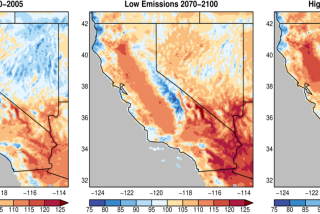Unocal May Be Liable in Myanmar Case, Judge Rules
- Share via
In a landmark but little-noticed ruling with enormous implications for U.S. companies operating abroad, a federal judge presiding over an ongoing human rights case has held that Unocal Corp. can be held liable for abuses allegedly committed by the government of Myanmar.
The ruling is the first in which a federal court has ruled that under international and U.S. laws, American firms could be liable for human rights abuses committed by their partners in another country, according to legal and human rights experts.
“The implications are huge because it would vastly expand the jurisdiction of the U.S. court system,” said Gary Hufbauer, a senior fellow with the Washington-based Institute for International Economics.
Human rights activists said a win in this unusual civil case would put corporations on notice that they are answerable not only for their own overseas behavior but for that of foreign companies they align themselves with.
“If Unocal would not engage in business with the Mafia in California, why should it engage in business with [Myanmar’s military junta]?” asked John Bonifaz, a leading human rights attorney involved in a second lawsuit against Unocal on similar charges.
Though it faces a vigorous appeal, last month’s ruling by U.S. District Judge Richard Paez of Los Angeles is considered a crucial victory for the opponents of the notorious regime that has ruled the nation formerly known as Burma since 1988.
Unocal is a partner with the state-owned Myanma Oil & Gas Enterprise in a controversial $1.2-billion pipeline project in that country. Unocal also pays the government to provide labor and security on the project. Another private-sector partner, the French oil firm Total, can also be held liable for Myanmar’s actions, the judge ruled.
In denying Unocal’s motion to dismiss a lawsuit by opponents of Myanmar’s repressive regime, Paez said Unocal’s payments to military leaders for providing labor and security--in spite of widespread allegations of forced labor and abuse--would be akin to “participation in slave trading” if such abuses were proved in court.
Unocal President John Imle expressed disappointment in Paez’s ruling and said the company will vigorously fight the “false allegations” in court.
The company has repeatedly defended its role in Myanmar as being in the long-term best interests of the nation’s people.
“I feel there are a lot of people out there trying to smear our image,” Imle said.
While dozens of U.S. firms have pulled out of Myanmar in recent years, Unocal has stood firm, making it a lightning rod in the debate over U.S. policy toward the country.
In addition to the lawsuit, the El Segundo-based energy giant faces new scrutiny on two other fronts where its business ties with Myanmar’s rulers are portrayed in an increasingly unfavorable light.
As pressure mounts on President Clinton to impose tougher sanctions on Myanmar, a bipartisan coalition in Congress is poised to introduce legislation that would immediately block any new U.S. investment in the country, a step that opponents say could halt Unocal’s pipeline project midstream.
“They’re on the wrong side of history here,” said Sen. Mitch McConnell (R-Ky.), one of the sponsors of the bill.
The U.S. has already cut off assistance to Myanmar and denied visas to its leaders.
But tougher sanctions are getting more supporters, including prominent congressional leaders from both parties and the editorial board of the strongly pro-business Wall Street Journal.
Imle said the proposed ban on new investment in Myanmar would hurt his company’s plans to further expand its operations in a critical part of the world.
When completed, the Myanmar pipeline will primarily supply gas to Thailand, making it a key piece in the company’s Asia strategy.
“We hope to have new investments in Myanmar,” he said.
Meanwhile, the energy giant was rebuffed by the Securities and Exchange Commission in an effort to prevent shareholders from voting on a proposal to investigate recent charges that Myanmar’s state-owned energy company is a drug-laundering arm of the government.
While there is little likelihood that shareholders will approve the resolution at Unocal’s annual meeting in El Segundo on June 2, the debate calls attention to still more allegations of unseemly activity by the company’s partner.
The charges were made by Geopolitical Drug Watch, a Paris-based research group that says it has evidence that bank accounts linked to Myanma Oil & Gas Enterprise were used to launder hundreds of millions of dollars in drug money. U.S. drug officials say Myanmar supplies 60% of the heroin entering the United States.
Officials of Unocal, Total and their Myanmar partner have denied those drug-laundering claims.
Imle reiterated in an interview that the company will continue to fight efforts to further isolate Myanmar’s ruling State Law and Order Restoration Council, calling such measures bad foreign policy and ineffective because foreign companies will step into any void left by U.S. firms.
“The fastest way to democracy is to encourage economic development, not to stifle it by keeping people jobless, uneducated, without economic hope,” he said.
But the latest initiatives against Unocal reflect the increasing seriousness of the company’s predicament as the leading U.S. investor in a country censured Wednesday by the United Nations for widespread political repression and human rights abuses, including torture, imprisonment without trial and summary executions.
Tensions in the capital of Yangon, formerly Rangoon, have escalated since a recent bomb blast at the home of a top military leader that the government blamed on dissident groups in Japan.
That has raised fears about the safety of Nobel laureate and opposition leader Aung San Suu Kyi, who was physically attacked by government supporters in November and is now confined to her home. In the past year, a dozen opposition politicians have been kidnapped, with one presumed dead.
Paez’s March 25 ruling came in a lawsuit filed by activist lawyers on behalf of indigenous farmers in the Tenasserim region of Myanmar. The suit contends that the farmers and their families were forced to relocate and work on the pipeline project, beaten and otherwise abused by troops assigned to protect the project.
The plaintiffs want Unocal to withdraw from Myanmar and pay damages to the people living in the pipeline region.
Paez removed Myanmar’s military rulers and the state-owned energy company as defendants in the case on grounds that they are protected by sovereign immunity. But he refused to dismiss the case against Unocal and Total, rejecting the companies’ claims that the accusations lack merit and that they should not be held liable for any alleged abuses committed by their business partners.
He said Unocal and its chief executives could be held liable if it is proved that the company and the Myanmar government had “conspired or acted as joint participants to deprive plaintiffs of international human rights in order to further their financial interests in the Yadana gas pipeline project.”
Columbia University law professor Jack Greenberg, a specialist in human rights law, said the ruling appears to broaden the reach of the U.S. Alien Tort Claims Act, the same law by which a New York court has held that Serbian leader Radovan Karadzic and the estate of Philippine strongman Ferdinand Marcos are liable for human rights abuses of subordinates.
But Greenberg said the Unocal ruling’s implications for countless other companies in today’s global economy are so sweeping that appeals courts might feel compelled to narrow its scope.
Total remains a defendant on grounds that it also has U.S. operations and thus falls under jurisdiction of U.S. courts.
Drug charges against Myanmar’s leaders are given considerable credence by U.S. drug officials.
In February, the U.S. put Myanmar, the world’s largest producer of opium poppy, on a list of countries deemed uncooperative in fighting drugs.
“Drug money is so pervasive in the Burmese economy that it taints legitimate investment,” Robert Gelbard, assistant secretary of State for international narcotics and law enforcement affairs, said at the time.
A high-ranking State Department official, speaking anonymously, said last week that foreign investors are increasingly “at risk” of getting caught up in dirty dealings because Myanmar’s rulers are allowing drug traffickers to set up money laundering operations and invest in legitimate businesses.
But the official said the U.S. government has no proof that Unocal’s partner, Myanmar’s state-owned energy company, is involved in illicit drug activities.
More to Read
Inside the business of entertainment
The Wide Shot brings you news, analysis and insights on everything from streaming wars to production — and what it all means for the future.
You may occasionally receive promotional content from the Los Angeles Times.










